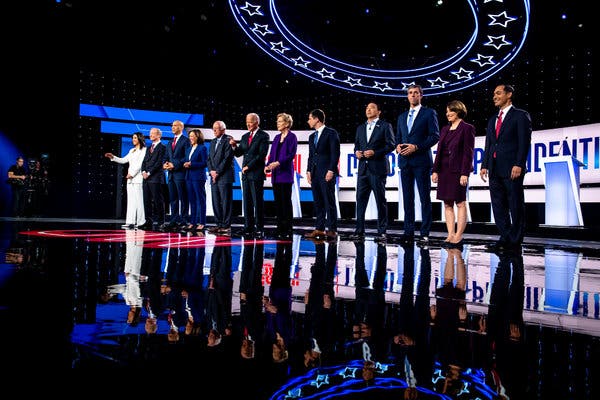The Democratic Presidential Primary Debate on October 16, 2019 marked a major turning point in the primary. It was one of Senator Bernie Sanders’ first major national appearances after suffering a heart attack, Elizabeth Warren’s first debate after taking the lead in the RCP polling average, and Joe Biden’s chance to respond after getting entangled in the whole Ukraine debacle that inspired House Democrats to start impeachment proceedings against President Trump. There were also nine other candidates on the stage, but none had the breakout moment they needed to reach the top tier of the Democratic primary. These lower-tier candidates were not incredibly productive towards furthering the discussion. Matt De Meulder, a Junior at Ridgewood High, criticized the debate as “not incredibly helpful as low polling candidates only attempted to create soundbites in hope of gaining traction.”
Bernie Sanders
After suffering a health issue two weeks prior, Bernie Sanders’ performance provided a strong rebuttal to his critics. He responded to the questions about his age with humanity and emotion and proved that he could handle the debate stage by remaining strong, sharp, and focused throughout the entire three hour debate. Bernie had lost his voice during the September debate a month earlier, so his energetic and healthy demeanor was refreshing for voters and supporters alike. His crystal clear layout of his signature policy proposal, Medicare For All, and the taxes that it would impose was especially noteworthy, while Elizabeth Warren refused to answer a similar question directly. Bernie removed any doubt about the possible repercussions of his heart attack, stayed sharp and nimble, and gave voters an honest impression overall. He also seemed to have an influence over the entire debate with his plan, Medicare For All, being the centerpiece of discussion during the event. Moreover, even candidates that were opposed to him on policy, like Biden and Klobuchar, gave him credit for being an honest person.
Elizabeth Warren
Senator Elizabeth Warren seemed like the frontrunner of this debate, both in polling and in getting targeted by Joe Biden and a whole host of other opponents. With this, she definitely held her own, even though she lacked any stunning moments that could change the shape of the race drastically. Patrick De Meulder, a Junior at Ridgewood High School, described her as “relentless and determined throughout” while the lower-tier candidates tried to create soundbites and buzz by fighting with others on the stage. When Senator Kamala Harris kept badgering Warren about blocking Trump’s Twitter account, Warren refused to respond, opting to ignore Harris’ interruptions. This moment was not a positive for Harris’ campaign; Kamala’s insistence on Trump’s Twitter is unlikely to stick with voters, and came off as completely misguided and miscalculated considering that there were many life-changing issues were discussed at Tuesday’s debate. However, this did turn out to be a positive for Warren since it proved that she was focused on America’s structural issues rather than on insignificant social media technicalities and gaining political points.
Despite her positive debate performance, many viewed her answer to the Medicare For All taxation question as an example of her dishonesty. When asked whether Medicare For All would raise middle class taxes, Warren responded that costs would go down. This exchange occurred three times, with Warren evading the question. Finally, Sanders jumped in and acknowledged that taxes would go up while the cost overall would decrease much further than the tax increase. Klobuchar responded that “at least Bernie’s being honest here and saying how he’s going to pay for this and that taxes are going to go up,” which further solidified Bernie’s reputation as the extremely principled and honest candidate. Overall, this entire exchange was viewed by some, like Patrick De Meulder as an example of Warren’s “great” debating skills. However, other observers saw this as an example of Warren’s approach of being very calculated and playing political games at the expense of clarity and viewer-perceived honesty.
Joe Biden
Joe Biden suffered an average debate, about on par with his performance in the previous three debates. This is to say that Biden seemed to be speaking in slow motion and he tripped over words, stuttered, and repeated himself countless times. Biden did not have any spectacular moments and Bernie delivered a highly effective rebuttal to Biden’s attack about Bernie and Warren’s congressional performance that ended up painting Biden as out of touch with the electorate. While Biden questioned the achievements of both Warren and Sanders, Sanders delivered one of his most potent lines. Bernie questioned Biden’s “impressive career of bipartisanship,” contending that Biden’s accomplishments include “the disastrous war in Iraq…[,] a bankruptcy bill, which is hurting middle-class families all over this country[,]…[and] trade agreements, like NAFTA and PNTR, with China… which have cost [America] 4 million jobs.”
The other nine candidates struggled to have substantial moments that could elevate them to the top tier, even though they tried to simulate this by attacking other candidates. However, this may have turned some voters off from the candidates that caused unnecessary drama. Matt De Meulder saw this as action as unappealing and a liability for Mayor Pete “due to his countless, angry attacks on other candidates.”
No matter how these nine low-tier candidates performed, however, they were very unlikely to elevate in polling in any case. This debate further proved that Warren, Biden, and Sanders were uninterested in engaging with the nine lower tier candidates. Consequently, those lower polling candidates looked to chip away at the polling numbers of those at the top. However, this dynamic created fighting to score political gains, a force that turned out to be detrimental towards the clarity and overall power of the debate towards educating the American people.
Aaron Friedman
Staff Writer
Graphic: The New York Times

